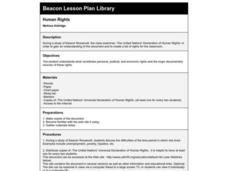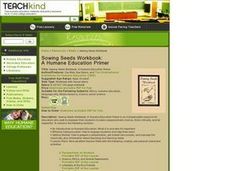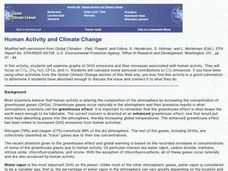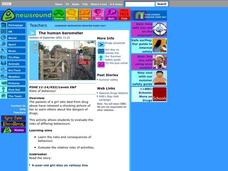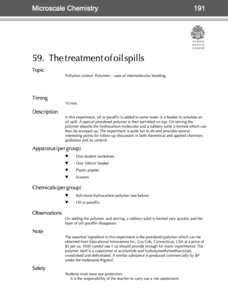Curated OER
Case Study: Should the Results of the Human Genome Project be Sold for Profit?
Students investigate a case study and discuss whether scientists working on the Human Genome Project should be allowed to patent their work. They consider ethical and legal issues, and determine who owns genetic information.
Curated OER
Bioethics and Humans
Students evaluate "humanity" and conditions associated with it. In this activity lesson students take on issues and construct their own limitations by defining the "human" condition.
Curated OER
Human Rights
Third graders study The United Nations' Universal Declaration of Human Rights and Eleanor Roosevelt.
Curated OER
Mapping Human Rights in Our Community
Students work in groups to draw a map of their town or neighborhood. They include their homes, major public buildings and places. Students analyze their maps from a human rights perspective.
Curated OER
The Elderly Poor: Human Rights
Students examine facts about the elderly population of the United States that lives in poverty through the context of universal human rights. They participate in class discussion, review census records, read case studies, interview...
Curated OER
Sowing Seeds Workbook: A Humane Education Primer
Students are introduced to Humane Education. They analyze what it is and why it's important. Students access how to get involved in schools and address this issue. They explore how to become Eco-Friendly.
Curated OER
Human Activity and Cllimate Change
Students perform activities to explore the affect of human activity on climates. They examine graphs of GHG emissions and their increases that are associated with human activity. Using a Global Climate Changing website, students explore...
Curated OER
Human Trafficking & Modern Day Slavery - Local Dynamics
Students are introduced to the topic of human trafficking. They identify the main reasons why people are trafficked. Using the internet, they research the trafficking routes, rehabilitation centers and the magitude of the problem in a...
Curated OER
The human barometer
Students read the story: 9-year-old girl dies on railway line. They engage in the 'Human Barometer': Collect a range of names of dangerous activities from the class. For example: skateboarding, waterskiing, bungee jumping, climbing,...
Curated OER
Human Rights
Young scholars explore the importance of laws and the need to speak up against wrong doing and how to bring change in society and in the law. They discuss the needs and concerns of others. Students explore the concept of bias and...
Curated OER
Human Impact on Water Quality
Learners identify at least three common repercussions of developing water front property on water quality. They describe three sources of water pollution. They research the organism striped bass and observe it if striped bass is available.
Curated OER
Grade 11 and 12 - Personal Development (Mental Well-Being)
Students relate emotional health and well-being to personal productivity and to the workplace design, implement, assess, and evaluate a plan to promote personal, school, and community well-being
Teach Engineering
Pill Dissolving Demo
Plop, plop, fizz, fizz, oh that one is the fastest. The teacher demonstration is the second part of a four-part series. The class observes how different pill types dissolve in simulated stomach acid. They determine which one dissolves...
Howard Hughes Medical Institute
Zebrafish and Skin Color
You may not know if that zebrafish in your fish tank is a model citizen—but it is definitely a model organism! What can we learn about ourselves from a tiny zebrafish? Discover more about the polygenic trait of skin color through a...
Advocates for Human Rights
Who are Immigrants?
What do Jerry Yang, Patrick Ewing, John Muir, Charlize Theron, Peter Jennings, and Saint Frances X Cabrini all have in common? They are all immigrants to the United States. Famous and not-so-famous immigrants are the focus of a resource...
Healthy Native Youth
Chapter 5: Learning About HIV/AIDS/STI's and Hepatitis Transmission
Middle schoolers delve deep into facts about HIV, AIDS, Hepatitis, and other STI's by way of discussion and a hands-on activity. Scholars ask and discuss questions anonymously using a Question Box. Two experiments showcase the...
Wilderness Classroom
Pollution
Educate scholars on pollution—air, water, and land—with a series of lessons that begin with a thorough explanation of each type. Learners then take part in three activities to reinforce the importance of reducing pollution. They...
Beyond Benign
Ecological Footprint
How does your lifestyle measure up in terms of your ecological footprint? Young ecologists examine their impact on the planet using an insightful online calculator. A short quiz asks users to rank the size of their homes, their energy...
Baylor College
Heart Rate and Exercise
Teach your exercise enthusiasts to read their pulse rate at the radial artery and multiply by four to calculate beats per minute. Learners perform a variety of activities, recording their heart rates after one minute of each. Though this...
Science Matters
Ecosystem Pre-Assessment
Test scholars' knowledge of ecosystems with a 20-question pre-assessment. Assessment challenges learners to answer multiple choice questions, read diagrams, and complete charts.
Marine Institute
Water Pollution
Sixth graders investigate the various types of pollutants found in water and ways to help prevent water pollution. Through a hands-on experiment, students create samples of polluted water by mixing water with vegetable oil, dirt, and...
Royal Society of Chemistry
The Treatment of Oil Spills—Microscale Chemistry
When oil spills happen, how is the oil cleaned up? Pupils of polymer science discover an amazing substance that turns oil into a solid during a microscale experiment. Individuals observe oil or paraffin before and after addition of the...
National Endowment for the Humanities
Using Historic Digital Newspapers for National History Day
Your learners will take a trip through history as they peruse through historic digitalized newspapers, reading real articles from such historical periods in the United States as the Temperance movement and passage of the Thirteenth...
Baylor College
Heart and Circulation: Pre- and Post-Assessments
Middle schoolers demonstrate what they know about the structure and function of the heart and blood vessels. A set of 15 multiple-choice questions also addresses how the heart handles microgravity and how animals without circulatory...




